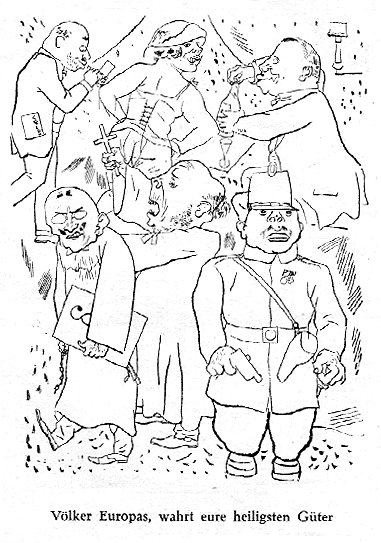A moral obligation to deal with something.
The responsibility is closely connected with someone’s role in the society. It involves the things one is accountable for, and a penalty if responsibility is disregarded. As any action has a cause, it has a consequence. The responsibility implies consciousness of ourselves as agents, i.e., the responsibility for oneself but also for the others. The causal responsibility for our own thoughts, natures, and actions is the core problem of any theory of action.
Recommended artwork

enlarge image
People of Europe, guard your sacred values, drawing by George Grosz, Berlin: Malik Verlag, 1923
Source Graphic Witness
This critical drawing is part of the collection translated as "One Day We'll Get Even" or "The Day of Reckoning" published in 1923 in Berlin. George Grosz depicted chaotic shift in German society emerged after the First World War. The main characters of his drawings were capitalists, prostitutes, criminals, military cast, war-invalids, bureaucracy, priests… They played in a scenes of the social immorality, the collapse of middle class, the downturn of economy, or political-business corruptive affairs. Due to the hyperinflation in Germany, the poor got poorer and the rich got richer. The value of labour was decreasing while the business loans were pied off with devalued money. In the drawing “Stinnes and his president,” part of a collection "One Day We'll Get Even", Grosz made reference to Hugo Stinnes, a businessman who gained control over 1600 companies for a tiny part of their real value.
An example in the ARTS -> “When you start to think that you can create something out of nothing it is very difficult to resist.”(1)
D.S: “I’ve attended a very interesting dinner organized by Hank Paulson, a little more than one year ago, with some officials and a couple of CEOs from the biggest banks in the U.S. Surprisingly enough, all these gentlemen were arguing we were too greedy so we have part of responsibility. Fine. Then they are turning to the treasurer, to the secretary of the treasury, and say you should regulate more because we are too greedy, we can’t avoid it.”
I: “The only way to avoid this is to have more regulation. I have spoken to many bankers about this question, including very senior ones. This is the first time that I’ve ever heard anybody say that they actually wanted their compensation to be regulated.”
D.S: “Yes, because it was at the moment where they were afraid. And after, when solution to the crisis began to appear they changed their mind.”(2)
A.S: “They were having massive private gains at public loss… Why should the financial engineer be paid four times to a hundred times more the the real engineer? A real engineer builds bridges, a financial engineer builds dreams, and when those dream turn out to be nightmares, other people pay for it.“(3)
REF -> Transcript: The documentary about the global economic crisis of 2008 Inside Job (2010). Directed by Charles Ferguson, written by Charles Ferguson and Chad Beck. Staring: Matt Damon as narrator.
(1) Lee Hsien Loong, a Prime minister, Singapore;
(2) Interview with Dominique Strauss-Kahn, a Managing Director of International Monetary Fund;
(3) Andrew Sheng, a Chief Advisor of China Banking Regulatory Commision.
https://www.imdb.com/title/tt1645089